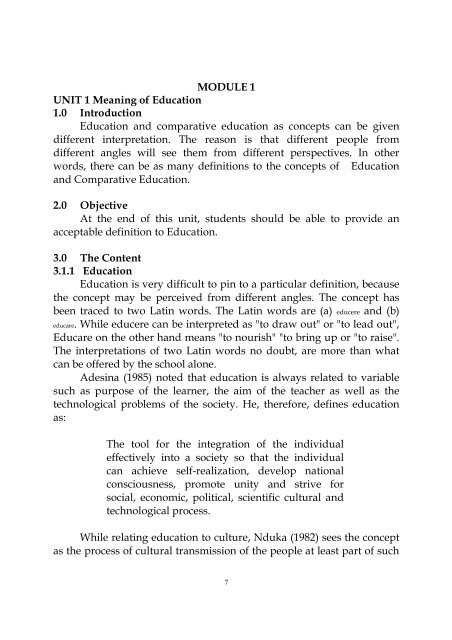edu 304 - comparative education - National Open University of Nigeria
edu 304 - comparative education - National Open University of Nigeria
edu 304 - comparative education - National Open University of Nigeria
You also want an ePaper? Increase the reach of your titles
YUMPU automatically turns print PDFs into web optimized ePapers that Google loves.
MODULE 1<br />
UNIT 1 Meaning <strong>of</strong> Education<br />
1.0 Introduction<br />
Education and <strong>comparative</strong> <strong>edu</strong>cation as concepts can be given<br />
different interpretation. The reason is that different people from<br />
different angles will see them from different perspectives. In other<br />
words, there can be as many definitions to the concepts <strong>of</strong> Education<br />
and Comparative Education.<br />
2.0 Objective<br />
At the end <strong>of</strong> this unit, students should be able to provide an<br />
acceptable definition to Education.<br />
3.0 The Content<br />
3.1.1 Education<br />
Education is very difficult to pin to a particular definition, because<br />
the concept may be perceived from different angles. The concept has<br />
been traced to two Latin words. The Latin words are (a) <strong>edu</strong>cere and (b)<br />
<strong>edu</strong>care. While <strong>edu</strong>cere can be interpreted as "to draw out" or "to lead out",<br />
Educare on the other hand means "to nourish" "to bring up or "to raise".<br />
The interpretations <strong>of</strong> two Latin words no doubt, are more than what<br />
can be <strong>of</strong>fered by the school alone.<br />
Adesina (1985) noted that <strong>edu</strong>cation is always related to variable<br />
such as purpose <strong>of</strong> the learner, the aim <strong>of</strong> the teacher as well as the<br />
technological problems <strong>of</strong> the society. He, therefore, defines <strong>edu</strong>cation<br />
as:<br />
The tool for the integration <strong>of</strong> the individual<br />
effectively into a society so that the individual<br />
can achieve self-realization, develop national<br />
consciousness, promote unity and strive for<br />
social, economic, political, scientific cultural and<br />
technological process.<br />
While relating <strong>edu</strong>cation to culture, Nduka (1982) sees the concept<br />
as the process <strong>of</strong> cultural transmission <strong>of</strong> the people at least part <strong>of</strong> such<br />
7
















